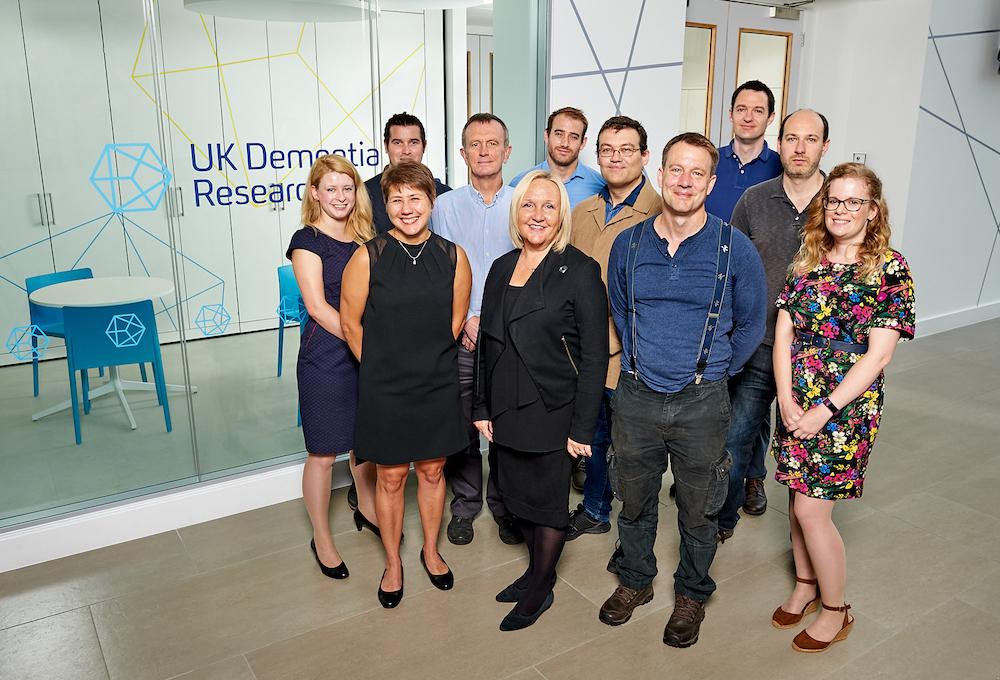We are thrilled to announce a major new initiative to explore risk factors that contribute to the development of Alzheimer’s disease. Led by Prof Julie Williams, Centre Director from UK DRI at Cardiff, the new platform – called the IPSC Platform to Model Alzheimer’s Disease Risk (IPMAR) - aims to become one of the largest cellular model resources available to study the condition, accessible to researchers across the world.
This programme is the third awarded in our series of Directors’ Strategic Initiatives from the UK DRI, joining the Gene Therapy Platform (UK DRI at King’s) and the Multi-‘omics Atlas Project (UK DRI at Imperial).
Modelling genetic risk in Alzheimer’s disease
Of the 50 million people living with dementia worldwide, Alzheimer’s disease is the most common cause. The risk of developing the late-onset form of the condition is estimated to be 60-80% genetic, and therefore greater understanding of this risk will help determine the causes of disease and a path to much-needed treatments.
Individuals with the familial, inherited form of Alzheimer’s disease have mutations in key genes that sadly guarantee the development of the condition. These mutations have been used for decades to create both cellular and animal models that mimic aspects of the human condition and help scientists learn more about Alzheimer’s.
However, in the majority of cases, the risk of developing the disease is likely to be a combination of the small effects from thousands of our genes, along with environmental factors such as lack of exercise. So scientists have more recently been analysing huge genetic datasets to determine polygenic risk scores (PRS), which are a calculation of an individual’s overall risk for developing Alzheimer’s disease.
Researchers from the UK DRI at Cardiff are leaders in this field and have produced the most robust calculations for PRS, with the ability to predict Alzheimer’s disease risk with 78-84% accuracy in the general population. The genetic work carried out by the team also points to the involvement of several biological pathways, suggesting multiple components combine to trigger disease.
The risk of developing the late-onset form of the Alzheimer's disease is estimated to be 60-80% genetic
The polygenic score can capture the true complexity of this disease reflecting the combination of multiple genetic risk factors...IPMAR LeadProf Julie Williams
Modelling the complex genetics behind Alzheimer’s represents a huge challenge but is an important next stage in unravelling the causes of disease. Prof Williams and colleagues believe that one solution to this lies in the development of induced pluripotent stem cells (iPSCs). These cells can be derived from people who possess an unusually high or low number of genetic risk variants (at the so-called ‘polygenic extremes’, and are at a high or low risk of developing Alzheimer’s).
Created from skin or blood cells, iPSCs are stem cells which are pluripotent – meaning they can be grown into any other cell types. They are an invaluable resource to researchers and a means to study the effect of common genetic risk for Alzheimer’s, providing new insights into disease biology and mechanisms, therapeutic targets, drug validation and ultimately, new treatments to prevent or modify the condition.
Building the platform
The UK DRI at Cardiff is an internationally-recognised centre for Alzheimer’s genetics, and with Prof Williams as a co-leader of the International Genomics of Alzheimer’s Project (IGAP), they have collected together the largest group of research data around diagnosed Alzheimer’s cases in the UK, and healthy individuals for comparison - comprising 3,505 and 2,421 separate cases respectively.
The team plan to harness this resource, which includes clinical, genomic, longitudinal data and extensive biological samples (cell lines, plasma, serum, RNA, DNA, urine) taken over the past 20 years, to create and validate up to 60 human-derived iPSC lines for generating models with high and low polygenic risk for Alzheimer’s.
Furthermore, studies from Cardiff and elsewhere have shown that over 50% of genetic risk variants for Alzheimer’s can be found in immune cells found in the brain: microglia. The team therefore plan to change or ‘differentiate’ 44 of these new IPSC lines into microglia-like cells for more specific testing and analysis of risk variants in this cell type.
IPMAR Lead, Prof Julie Williams, said:
“These human iPS cells provide a novel means to model the most common form of Alzheimer’s disease which occurs after the age of 65. The polygenic score can capture the true complexity of this disease reflecting the combination of multiple genetic risk factors and allowing the research community to test for disease relevant changes in different environments, at different stages of disease development and test drugs which could reverse these effects.”
human-derived iPSC lines will be created and validated for generating models with high and low polygenic risk for Alzheimer’s

The senior team of Group Leaders and Fellows from the UK DRI's centre at Cardiff, led by Prof Julie Williams (centre)
A resource for all
The cell lines generated, and associated data, will not only be accessible to UK DRI groups but also the wider research community. With Prof Williams and the team at UK DRI at Cardiff leading the initiative, the project brings together several collaborators and partners. Dementias Platform UK will host access to the platform, with the advantages of being able to combine clinical, genetic and polygenic data. Following approval for use by a virtual access committee made up of representatives from UK DRI, applicants for the cell lines will be directed towards the European Bank for Induced Pluripotent Stem Cells (EBiSC) to select relevant lines created from IPMAR.
The UK DRI has provided £1.86m of funding for the IPMAR project, as part of our Directors’ Strategic Initiatives series. IPMAR entered its pilot phase in early 2021, and will begin generating new cellular models later this year.
UK DRI Director, Prof Bart De Strooper, said:
“The development of IPMAR will be a significant and important milestone for Alzheimer’s research in the UK, helping catalyse new discoveries in the search for effective treatments.
I’m proud of the UK DRI’s role in the dementia research ecosystem, and our doors are open to share tools and resources that support researchers in our collective mission to further understand the causes. IPMAR embodies that commitment.”
Article published: 29 April 2021
Banner image: Kateryna Kon/Shutterstock.com
